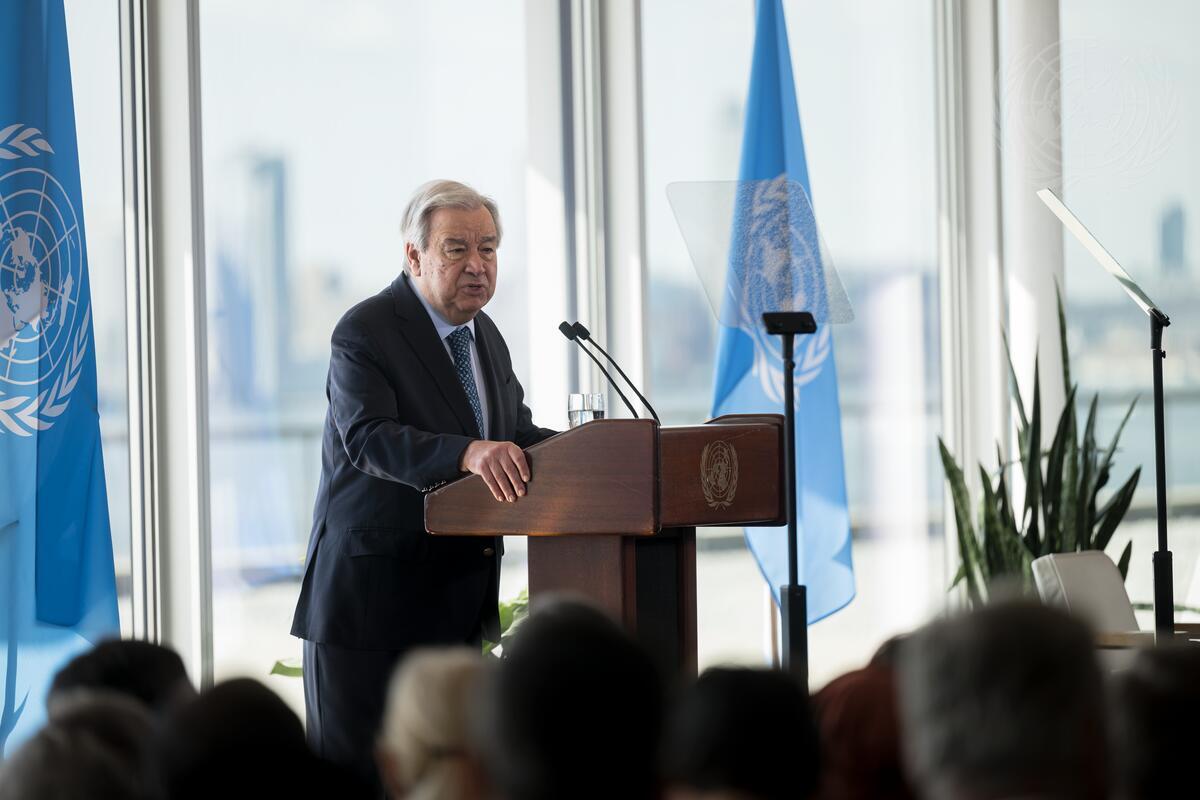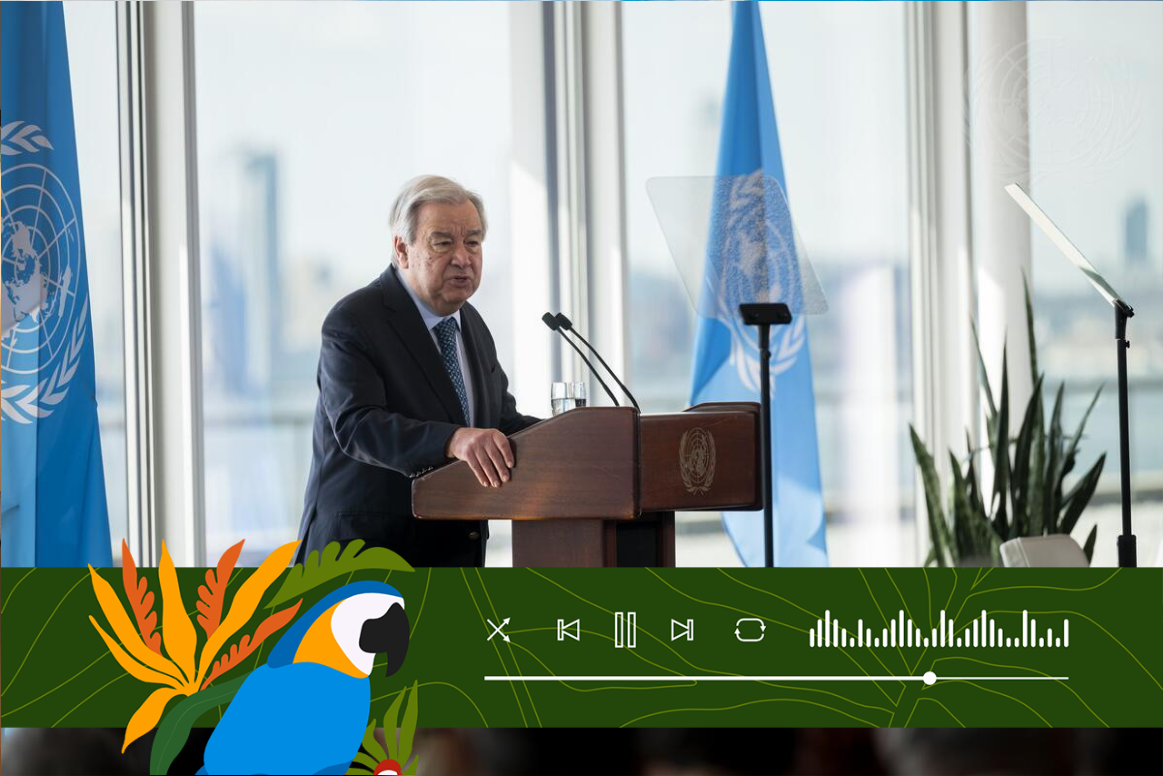Guterres: insisting on fossil fuels is 'sabotaging economies,' and renewable energy is already more profitable
The Secretary-General of the United Nations presented data from a new report by the International Renewable Energy Agency that demonstrate the economic advantage of using renewable energy over non-renewable sources.

Reportagem: Laura Marques | COP30 Brasil
In a statement delivered this Tuesday, July 22, the Secretary-General of the United Nations, António Guterres, affirmed that countries continuing to rely on fossil fuels as their main energy source are sabotaging their economies. The UN chief highlighted the progress nations have made in investing in renewable energies and presented a new report that demonstrates the competitive advantage of these resources in terms of cost, accessibility, and employability compared to non-renewable sources.
Citing data from the new report by the International Renewable Energy Agency (IRENA), Guterres emphasized that $2 trillion was invested in clean energy worldwide last year, which is $800 million more than the amount spent on fossil fuels in the same period. This represents a 70% increase over 10 years, since the establishment of the Paris Agreement.
According to the document, solar energy is currently 41% cheaper than non-renewable sources, while offshore wind energy is 53% cheaper. In addition, the report states that more than 90% of renewable sources worldwide generated electricity at a lower cost than the cheapest fossil alternative in 2024. “This is not just a change in energy source—it is a change in possibilities, a way to reconcile with the climate,” stressed the UN Secretary-General.
In light of the greater economic viability proven by the survey, Guterres issued a warning to nations: “Countries clinging to fossil fuels are not protecting their economies—they are sabotaging them, increasing costs, weakening competitiveness, becoming stuck with stranded assets, and missing out on the greatest economic opportunity of the 21st century, ” he emphasized.
According to the Secretary-General, renewable energy sources are the foundation of energy security and sovereignty, while the greatest threat to these principles comes from fossil fuels. “These leave economies and populations at the mercy of price shocks, supply disruptions, and geopolitical turbulence. Just look at Russia's invasion of Ukraine. A war in Europe triggered a global energy crisis, oil and gas prices soared, and electricity and food bills followed the same path”, he recalled.
Progress
Renewable energy sources have nearly matched fossil fuels in terms of globally installed energy capacity, according to the study presented by Guterres. According to the UN leader, the future of clean energy is no longer a promise—it is a fact. “This is just the beginning. Last year, almost all of the new energy capacity that was built came from renewable sources. Every continent on Earth added more capacity from renewables than from fossil fuels,” he reported.
The survey also points out that for decades, emissions and economic growth rose side by side. However, in many advanced economies, emissions have peaked while growth continues. In 2023 alone, clean energy sectors fueled 10% of global GDP growth. In India, the increase was 5%; in the United States, 6%; in China—a leader in the energy transition—20%; and in the European Union, nearly 33%.
In addition, jobs in the clean energy sector have already surpassed those in the fossil fuel industry, employing nearly 35 million people worldwide. Guterres drew attention to the fact that the state of Texas—the heart of the fossil fuel industry in the United States—is now a national leader in renewable energy. “Why? Because it makes economic sense,” he explained.
Challenges
Fossil fuels continue to benefit from a global consumption subsidy imbalance of nine to one, according to the report. “A market distortion. If we add the incalculable costs of climate damage to people and the planet, the distortion becomes even greater,”Guterres noted.
The Secretary-General also warned of the urgent need to accelerate the energy transition in light of the climate crisis, which has already devastated lives and livelihoods, wiped out more than 100% of the GDP of island states, and caused insurance premiums to soar in the United States. “The 1.5-degree global warming limit is in unprecedented danger. To keep it within reach, we must drastically accelerate emissions reductions and the expansion of the clean energy transition, with production capacity growing, prices falling, and COP30 fast approaching,”he concluded.
He listed six fronts that need to be addressed in this regard:
- presentation of new national climate plans (NDCs) before COP30.
- building 21st-century energy systems by investing in clean energy storage;
- responding sustainably to the growing global energy demand, with the technology sector leading this shift;
- consolidating a just energy transition with equity, dignity, and opportunity for all;
- making trade and investment drivers of the transition;
- and reforming the international financial architecture to enable the flow of investments into renewable energy.
Guterres invited leaders to present their NDCs—Nationally Determined Contributions—at an event in September, during the High-Level Week of the United Nations General Assembly.
Learn more
The Secretary-General’s special address, titled “A Moment of Opportunity: Driving the New Era of Energy,” was attended in person by international authorities at the United Nations General Assembly in New York (USA), including the COP30 President, Ambassador André Corrêa do Lago, and was broadcast via UN Web TV. The speech is a continuation of last year’s address, “Moment of Truth.”
The technical report was prepared by the UN Climate Action team with support from UN agencies, funds, and programs, as well as international research institutions, bringing together the latest scientific evidence on advances, opportunities, and benefits of a new economy based on clean energy.
Translation: Michel Emmanuel Félix François (POET/UFC)
Proofreading: Tadeu Azevedo (POET/UFC)

